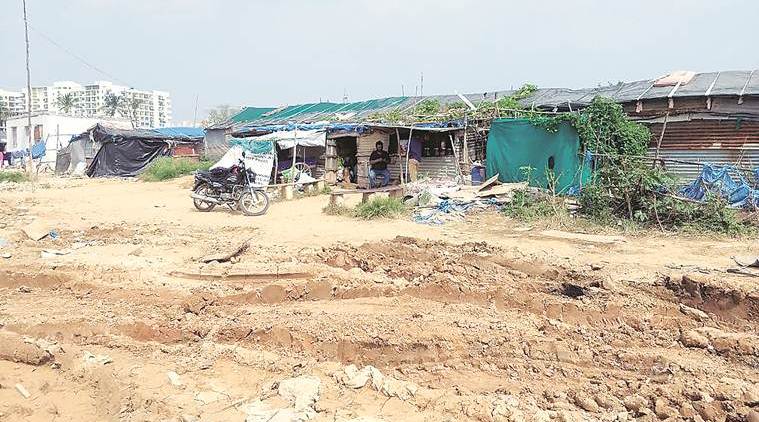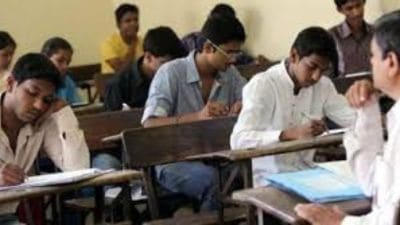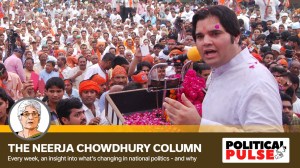- India
- International
Two sides of fear
As ‘illegal’ immigrants leave Bengaluru amidst a government crackdown, Thubarahalli, a colony of Bengali-speaking migrants in the city, has also drawn the line — “That is where the Bangladeshis live. Go harass them”
 Much of the camp is a wasteland, marked by dirt roads and tin shanties. Amrita Dutta
Much of the camp is a wasteland, marked by dirt roads and tin shanties. Amrita Dutta
A rotting plank flung across a gushing black sewer is called, sardonically, the Howrah Bridge. Beyond it, another undulating dirt road leads to the Kali Khata — an open field in east Bengaluru where mounds of waste stand as tall as tin huts. “That’s where the Bangladeshis live, that’s the other side,” says Bilap Dafadar, 30, who runs a small shop on this last stretch of a slum that stretches at least 3 km. “We are Indians, from West Bengal.”
The other side is a wasteland like this one. Dirt roads wind through similar tarpaulin-topped shanties made of tin, everywhere is the detritus from the city beyond — plastic bottles to shoe soles to beer cans. But here, there is also the flurry of panic. “We are leaving,” says a young woman, Laiju, a child cradled in her arms. “We are going back to Khulna, Bangladesh. They don’t want us here,” she says, before rushing out.
People watch guardedly from their huts; many are reluctant to talk or give their names. “Do you know about the great floods of 2001 in Bangladesh? We lost everything in it, our land, our homes. I am from Khulna. Since then, we have been on the move,” says Suman, a man in his thirties, who is less reticent. He came to Bengaluru two years ago. Here, he did “kooda kabadir kaam (waste work) for Rs 5,000-Rs 4,000 a month”, he says, pointing to the BBMP dumpers which stand in the distance. “I have sent my wife and daughter away. I don’t have money to pay for a train ticket. Otherwise, I would have gone too,” he says.
Surrounded by high rises, apartments, and a few kilometres from gleaming tech parks, this stretch in east Bengaluru’s Thubarahalli is a purgatory for the tonnes of dry waste the city spits out — from where it is segregated and sold, or sent to landfills. Among those contracted by the BBMP and private organisations to do this degrading work by hand, without any safety gear, are mostly Bengali-speaking migrants, many of them allegedly Bangladeshis.
“Most of the waste workers for BBMP are Bangladeshis. Bengalis like us do not get work from them. That’s because they ask few questions, and are ready to be paid almost nothing,” says Shariful, who also picks and segregates waste for a living.

On October 25, the Bengaluru police detained 60 alleged Bangladeshi illegal migrants, including 16 children. “There is fear. Several people are packing up and moving away. Some are headed to Bangladesh, some said they might go to Delhi. Some have packed off children and women to other cities. Many children are being pulled out of school,” says an activist with an NGO that works with migrant children. A few days later, the police commissioner’s warning against sheltering Bangladeshi immigrants led some apartment complexes in this stretch of the city to informally “ban” Bengali-speaking migrants.
It’s a suspicion that has repercussions on the other side too. The Thubarahalli settlement, which came up around 2010, is home to around 5,000 Bengali Muslims, many of whom are routinely mistaken for Bangladeshis. “Yesterday, when I went to an apartment for a sofa cleaning service, the customer asked me: are you Bangladeshi? Some of the apartments have said they won’t let Bengalis work,” says Jabbar Mondal, 38, who works for an urban solutions service.
Last December, protests by civil society organisations had stalled the municipal authority’s attempts to evict them from the land. On this day too, residents were seen trying to convince two policemen from the nearby Marathahalli police station. “They say, don’t you speak Bengali? We told them you can check our papers. We also told them to go and harass the Bangladeshis on that side,” says a resident. While they all speak Bengali, even if different dialects, a wall of animosity runs between the two communities.
Mondal is a migrant from Balipur village, Murshidabad, who moved here in 2001. Like most other migrants from Uttar Dinajpur, Bardhaman, Nadia, Howrah, Hooghly districts, they are landless farmers, or have little landholdings back home. “We are not Bangladeshis, we are Bengalis. You can go back to our villages and see. We have been living there since before 1947, and we have proof. Why do BJP leaders call us that? Don’t they know that there is a state in India called West Bengal? Then how did they get 18 MPs in Bengal?” says Monirul Haque, who is from Debagram, Nadia. “If they ask us to move, then we will say they should send all those people living in the apartments, too. They are outsiders, too,” says Dafadar.
There are few places in Bengaluru as wretched as these settlements. Here, people live without water or sanitary connections, amid the waste that they collect and segregate. On the wall of a tin shack is scrawled in Bengali daktarkhana, but no doctor visits. Instead, shacks sell medicines for fever, indigestion, and the ubiquitous Bengali malady of “gas”. “Everyone here has dengue or malaria all year around,” says Jamal Sheikh, 37, who runs a teashop.
“While most of the pourakarmika (municipal workers) are Telugu-speaking, the waste collection and segregation are done by Bengali-speakers,” says N S Ramakanth, of the Solid Waste Management Round Table.
In Thubarahalli, children hang around through the day, running in and out of piles of waste. They do not go to schools, where Kannada is the medium of instruction.
“People here do the most essential work in the city, from labour in the apartments to waste segregation, but they don’t get even basic amenities where they live. They don’t even have BPL cards,” says Khaleemullah, an activist who works with Bengali Muslims.
For 10 years, Jahangir Sheikh, 42, from a village in Nadia, worked as a garbage collector, picking up waste from three neighbourhoods for a BBMP contractor. Today, he calls himself a broken man. “I wasn’t paid anything for that work. The contractors ate up all our money, the money they get from BBMP to pay us wages. How did we survive? By selling the plastic and other waste,” he says. Two years ago, when he had had enough, he filed a case against the corporation. “Since then, they have blacklisted me. I can find no work,” he says.
Many waste workers have moved to working with private collection agencies, instead of the BBMP. “They also underpay us, but at least we get something,” says Shariful.
Pushed as they are to the bottom of the chain, the Bengali Muslims consider themselves more fortunate than the Bangladeshis, but there is also fear. “Can they do this to us too? We sometimes wonder,” says Mondal.
Why do they come so far, risking so much, only to earn Rs 5,000? At Kali Khata, Suman from Khulna says with emphasis. “Madam, you have no idea. There is no work in our country. But we will leave. We won’t come back again. Ei desher bhaath aar chai na (The rice of this country is not for us),” he says.
Apr 24: Latest News
- 01
- 02
- 03
- 04
- 05







































